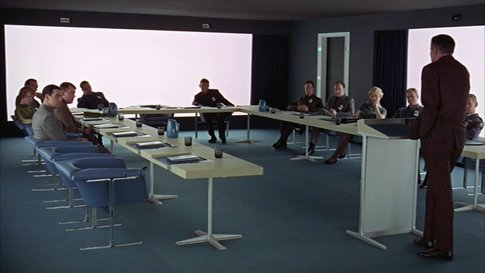Speaking of the think tank that helped Steven Spielberg create the world of tomorrow for 2002’s Minority Report, Wired reconvened some of the principals of that very productive two-day retreat to mark the tenth anniversary of the film. It sounds like it was a fascinating experience if a harried and discombobulating one. An excerpt:
Alex McDowell (production designer, Minority Report):
It was two full days at the Shutters Hotel in Santa Monica.
Jaron Lanier (computer scientist, virtual reality pioneer):
We pretended to be a conference of dental technicians or something boring.
Douglas Coupland (novelist, author of Generation X and Microserfs):
We sat around a big U-shaped table like that scene in 2001 — in that conference room on the moon.
Joel Garreau (principal of consulting firm The Garreau Group, in 1999 a reporter at the Washington Post):
I don’t think many of us knew what the fuck we were getting ourselves into.
Peter Schwartz (futurist, co-founder of scenario-planning firm Global Business Network):
We would ask questions: What about advertising? What about transportation? What about newspapers? What about food?
Stewart Brand (editor of Whole Earth Catalog):
They had graphic artists there who could immediately draw things that were being described.
Harald Belker (automotive designer):
We were supposed to just watch and listen and see what people had to say.
Coupland:
It was a big deal back then to have that real-time feedback.
Schwartz:
What about weapons? Surveillance — how did it work? One that moved very quickly was the gesture control of computers. That really began with Jaron. There was pretty quick agreement about what you saw onscreen.
Lanier:
We were doing these glove technologies that could be combined with displays. That was totally commonplace during that time as a demo thing — not as a consumer product. My recollection is that I brought in a working one. I could just pack one in the trunk.
Coupland:
I put together a whole book for it — a 2080 style book. We were told it was 2080, but then it ended up being 2050.•


